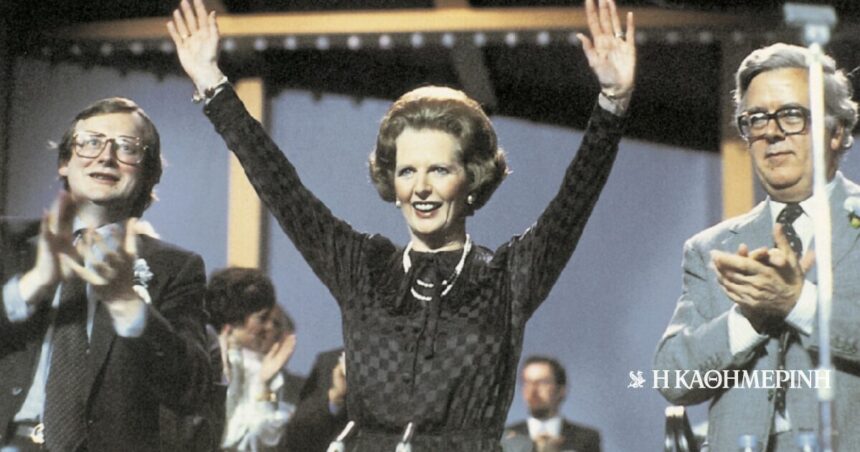Margaret Thatcher’s second election victory in 1983 was one of the most decisive in post-war Britain. The Conservatives benefited from a three-main contender race, in which the opposition vote was split between Labor and the newly formed Liberal Alliance/SDP. Thatcher saw her majority increase to 144 seats. In terms of vote share, Labor just managed to edge out the Alliance, in its worst electoral performance since 1918. The resulting victory gave the Conservatives their biggest parliamentary majority in the post-war era and their second biggest majority as a self-governing government, after the general election of 1924. Although Margaret Thatcher was one of the most unpopular prime minister during her early years in office, Britain’s victory in the Falklands in 1982 greatly improved her personal popularity and that of the Conservative government. The Labor Party, on the other hand, had been weakened by internal divisions – after former prime minister James Callaghan resigned as leader in 1980, it was led by Michael Foot, whose new policies were seen as considerably more left-wing. Several moderate Labor MPs had left the party to form the Social Democratic Party (SDP), which then formed the SDP-Liberal Alliance, working with the Liberal Party. The Labor Party was further hurt by its promise to leave the European Economic Community, which alienated its pro-European supporters.
Buoyed by the victory over Argentina in the Falklands, as well as the improved economic situation for some sections of the electorate, Thatcher, although initially reluctant, decided to go to the polls. It was mainly the results of the local elections in May and the favorable opinion polls that led her to this decision. In addition, the boundaries of the constituencies had been revised and the change seemed to favor the Conservative Party. When he announced the June 9 election, some polls showed him leading by as much as 18 points.
Defence, prosperity and employment
The Conservative election manifesto focused on three main pillars: defence, employment and economic prosperity. The Tories remained committed to membership of the European Economic Community, an independent nuclear deterrent, trade union reform, further privatisation, long-term tax cuts and the fight against inflation.
Labour’s manifesto, by contrast, “the biggest suicide note in history”, as it was later called, had at its core a 12-point plan with rigid commitments such as withdrawing from the Common Market, abolishing the House of Lords, canceling nuclear program Trident and the removal of cruise missiles from Britain. The manifesto was also found to lack accurate cost estimates, giving the Conservatives yet another important argument. The fact that several of Foot’s own colleagues had doubts about the contents of the document did not bode well, as Labour’s financial credibility was thrown into even greater doubt.
Labour, in particular, focused on jobs and economic recovery, issues that the Conservatives had criticized before the outbreak of the Falklands War, in an attempt to neutralize the positive effect of the “Falklands spirit”.
In January 1981, however, former ministers Roy Jenkins, Shirley Williams, Bill Rogers and David Owen left the Labor Party to form the SDP. In December of that year, according to the Gallup company, more than 50% of its sample said they would vote for the SDP/Liberal Alliance in the election, with the Conservatives and Labor following at 23% and 23.5% respectively respectively. There was already talk of the Alliance forming the next government and Jenkins becoming the first Alliance Prime Minister. Both major parties looked equally unpopular – Labor because of its shift to the left and the Conservative Party because of rising unemployment and cuts in public spending.
In general, the Conservative campaign was run in a more smooth and professional manner than Labour’s. Thatcher knew how to appeal to television viewers, while Foote was an old-fashioned politician who used to speak without notes and could not adapt to the new expectations of the election campaign.

Thatcher’s policies shaped the future course of the country
The Conservative Party’s victory in the 1983 election was largely attributed to the successful management of the Falklands War and Thatcher’s economic policies. The politics of “Thatcherism”, which focused on the free market and privatisation, resonated with many voters, especially the middle class. On the other hand, Labour’s proposals for nationalization and denuclearization were not widely accepted and voters turned to either the Conservatives or the SDP-Liberal Alliance, which managed to win a significant share of the vote, highlighting the dissatisfaction of many voters towards the two main parties. However, the electoral system did not allow proportional representation of their electoral strength in the House of Commons.
Even the Guardian was forced to admit that there could be no disputing the result: “This is a remarkable victory. Indeed, with more than three million unemployed and rising unemployment, this is a strange kind of miracle. Mrs Thatcher, who two years ago was the most unpopular British prime minister in modern times, has broken the mold of politics in the recession-stricken West.’

Thatcher said her first priority for the new term would be to reshuffle her cabinet. He insisted this would reflect a range of political views, saying: “I wasn’t extreme in the last four years and I’m not extreme now.” Defeated Labor leader Michael Foot described the result as a tragedy for the country. He said: “I agree with those who said that the fight to win the next election begins immediately and of course I fully accept my responsibilities in this election.”
Foote, however, also strongly attacked the SDP for withholding support from Labor – thus giving more seats to the Conservatives. The SDP’s Liberal Alliance blamed Britain’s electoral system for failing to convert its significant electoral support into seats in parliament – the Alliance had won 25.4% of the vote, the most for any third party in Britain since 1923, but secured just 23 seats, compared to 209 for Labor who had only 675,000 more votes. Alliance leader David Steele said: “I feel real outrage at the huge number of votes we got and so few seats to go with them.”


Long-term effects
The election was historic for the additional reason that it marked the beginning of a new era for Labour: three future leaders of the party (Tony Blair, 1994-2007; Gordon Brown, 2007-2010; and Jeremy Corbyn, 2015-2020) were elected to first time in this election, while its longest serving prime minister party until then, Harold Wilson, left parliament having completed a term of 38 years.
Thatcher’s electoral success in 1983 and the strong parliamentary majority she secured enabled her to proceed with greater confidence in the implementation of her policies. Its economic policy focused on reducing inflation, reducing taxation and privatizing state-owned enterprises. These policies were criticized by many as socially unjust, but supported by others as necessary for the country’s economic renaissance.
On the opposition side, the 1983 elections were a major turning point. The Labor Party, under the leadership of Neil Kinnock, after the resignation of Foot, began a process of renewal and modernization. The SDP-Liberal Alliance, despite its failure to convert its electoral support into seats, continued to play an important role in British politics, eventually leading to the creation of the Liberal Democratic Party in 1988.
The 1983 British general election remains one of the most important political events in modern British history. Thatcher’s victory and her subsequent political agenda shaped the future course of the country, and the effects of these results continue to influence the political scene to this day.
Mr. Alexandros Naufliotis holds a PhD in International History from the London School of Economics and Political Science and teaches Diplomatic History at the Hellenic Open University.
Edited by: Evanthis Chatzivasiliou
________________________________________________________________________________
Center photo: 9/6/1983: Thatcher celebrates on the night of her election victory. Although she was one of the most unpopular prime ministers during her first years in office, Britain’s victory in the Falklands a year earlier greatly improved her personal popularity. [ASSOCIATED PRESS]




